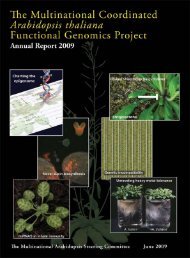75 Integrating Membrane Transport with Male Gametophyte ... - TAIR
75 Integrating Membrane Transport with Male Gametophyte ... - TAIR
75 Integrating Membrane Transport with Male Gametophyte ... - TAIR
Create successful ePaper yourself
Turn your PDF publications into a flip-book with our unique Google optimized e-Paper software.
303 Regulation of AGAMOUS Expression by Histone Methylation<br />
Joyce Cartagena 1 , Daisuke Kurihara 1 , Satoru Fujimoto 1 , Yoshitaka Azumi 2 , Susumu Uchiyama 1 , Sachihiro<br />
Matsunaga 1 , Kiichi Fukui 1<br />
1<br />
Osaka University, 2 Kanagawa University<br />
Plant SET domain proteins are known to be involved in the epigenetic control of gene expression during plant<br />
development. In Arabidopsis, SET domain proteins are assigned to four classes, namely E(Z), SU(VAR)3-9, TRX and<br />
ASH1, based on the homology of their SET domains. Here we report the potential role of an ASH1-related protein,<br />
SML (stamen loss), in regulating the expression of the floral homeotic gene, AGAMOUS, and its function in stamen<br />
development and differentiation. A loss-of-function phenotype of sml plants is characterized by defects in stamen<br />
initiation and development. Furthermore, the level of AG expression was significantly reduced among sml flowers. Using<br />
chromatin immunoprecipitation assays, it was revealed that SML does not directly bind to the regulatory regions of the<br />
AG gene. Instead, it was shown that SML regulates AG expression by methylation of specific lysine residues. Based on<br />
the functional and expression analyses performed on SML, we showed that SML is capable of regulating floral homeotic<br />
genes in Arabidopsis, particularly those involved in specification of whorl 3 floral organs.<br />
304 Two-step recruitment of RNA-directed DNA methylation to tandem repeat sequences<br />
Simon Chan 1, 3 , Yana Bernatavichute 1 , Xiaoyu Zhang 1 , Carey Li 1 , Steven Jacobsen 1, 2<br />
1<br />
Dept of MCD Biology, UCLA, 2 Howard Hughes Medical Institute, 3 current address: Section of Plant Biology,<br />
UC Davis<br />
DNA methylation silences transposons, but also regulates expression of a select group of endogenous genes.<br />
Arabidopsis FWA is silenced in adult tissues by DNA methylation on two tandem repeats, and a new copy of FWA<br />
transformed into plants is an efficient target for de novo DNA methylation. We have used FWA transformation as a<br />
model to study the initiation of DNA methylation, and have found that de novo DNA methylation is guided by siRNAs<br />
produced by an RNA interference (RNAi) pathway. Little is known about why FWA is recognized by the cell as a target<br />
for gene silencing. We show that tandem repeats are necessary and sufficient for de novo DNA methylation of FWA,<br />
and that repeated character rather than intrinsic sequence is important. Endogenous FWA can adopt either of two stable<br />
epigenetic states, methylated and silenced or unmethylated and expressed. Surprisingly, we found siRNAs associated<br />
<strong>with</strong> FWA in both states. The unmethylated endogenous fwa gene was able to recruit siRNA producing machinery, but<br />
could not easily regain DNA methylation. Preexisting CG DNA methylation was required to recruit further RNA directed<br />
DNA methylation to endogenous FWA, or to cause efficient de novo methylation of transgenic FWA. This suggests<br />
that tandem repeats are sufficient to recruit siRNA production, but a second event is required to recruit self-reinforcing<br />
DNA methylation factors acting in cis or in trans. Tandem repeats throughout the Arabidopsis genome produce siRNAs,<br />
suggesting that repeat acquisition may be a general mechanism for the evolution of gene silencing.





